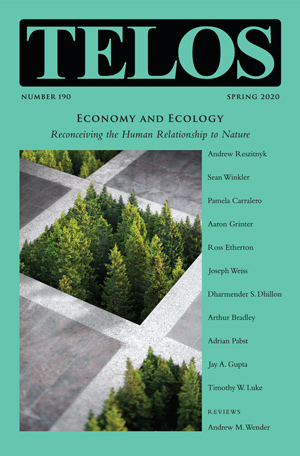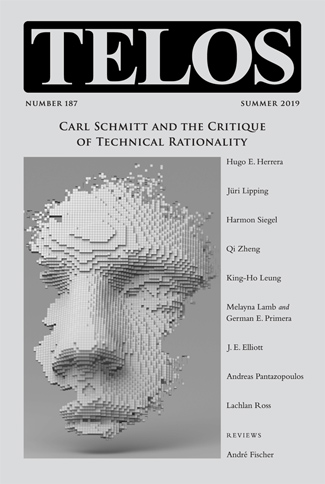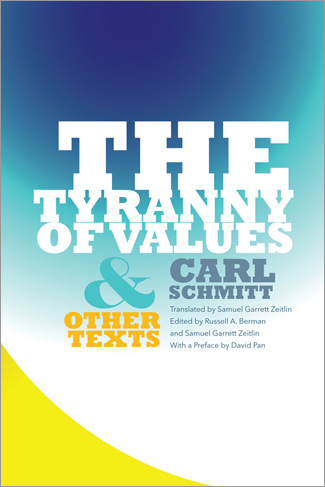By Pamela Carralero · Friday, June 12, 2020 Pamela Carralero’s “Scientific Modeling and the Environment: Toward the Establishment of Michel Serres’s Natural Contract” appears in Telos 190 (Spring 2020): Economy and Ecology: Reconceiving the Human Relationship to Nature. Read the full article at the Telos Online website, or purchase a print copy of the issue in our online store. Individual subscriptions to Telos are available in both print and online formats.
 In the sciences, the hypotheses driving the exploration of the natural world are often investigated via analogical transfer, meaning that the crux of scientific activity resides in the use and interpretation of models as tools that facilitate an accurate description of natural laws. The exact status of the model’s role and its lasting importance, however, remains a controversial topic among scientists and philosophers. For some, the model is a way of reaching a conclusive theorem or systematic statement; for others, including French philosopher Michel Serres, the model is a multifaceted space of translation that asks its interpreters to meditate on the inaccessible nature of what it makes accessible via ideogrammatic transcription. In the sciences, the hypotheses driving the exploration of the natural world are often investigated via analogical transfer, meaning that the crux of scientific activity resides in the use and interpretation of models as tools that facilitate an accurate description of natural laws. The exact status of the model’s role and its lasting importance, however, remains a controversial topic among scientists and philosophers. For some, the model is a way of reaching a conclusive theorem or systematic statement; for others, including French philosopher Michel Serres, the model is a multifaceted space of translation that asks its interpreters to meditate on the inaccessible nature of what it makes accessible via ideogrammatic transcription.
Placing Serres in conversation with Bruno Latour and Jacques Rancière, this article argues that Serres provides the tools to theorize models as mediums through which to acknowledge and interact with the environment as that which is innately inaccessible to human knowledge. This is a first step toward establishing what he calls a “natural contract,” a union of life-giving reciprocity between humans and nonhumans that offers new conceptualizations of knowledge and science as practices free from the totalizing codifications of human verdicts. More specifically, this article imagines models as gateways between the inaccessible and accessible, arguing their value as a setting for the construction and play of scientific interpretations. It concludes by examining the relationship between modern climate models and the inaccessible in order to propose a techno-scientific, intra-temporal mentality of uncertainty from which a natural contract can develop.
Continue reading →
By Arthur Bradley · Wednesday, April 1, 2020 Arthur Bradley’s “Terrors of Theory: Critical Theory of Terror from Kojève to Žižek” appears in Telos 190 (Spring 2020): Economy and Ecology: Reconceiving the Human Relationship to Nature. Read the full article at the Telos Online website, or purchase a print copy of the issue in our online store. Individual subscriptions to Telos are available in both print and online formats.
 This essay seeks to offer a new genealogy of contemporary critical theory of terror from Alexandre Kojève to Slavoj Žižek. It is clear that critical theory’s response to the volatile post-9/11 geopolitical landscape takes many forms, but one of its most controversial tasks has been a reclamation of the fatal signifier “terror” itself for the radical Left. According to thinkers such as Žižek and Alain Badiou, we must redeem the emancipatory core of the Jacobin Terror from its “Thermodorean” betrayal by two centuries of political and economic liberalism. Yet my claim is that this critical attempt to recuperate terrorism can only be understood in the context of a much longer debate about the meaning of “terror” within twentieth-century European philosophy, which stretches back to Kojève’s lectures on Hegel in the 1930s. This essay tracks the evolution of critical theory of terror from Kojève’s political ontology of terror in his (famously or notoriously) idiosyncratic interpretation of the Hegelian master–slave dialectic to its contemporary conclusion in Žižek’s embrace of Jacobin terror. If Kojève’s lectures effectively introduced Hegel into twentieth-century European philosophy, I will argue that they were also the platform for a wave of neo-Hegelian reflections on the historical, political, and philosophical stakes of terror including, most importantly, Emmanuel Lévinas’s Time and the Other (1947) and Maurice Blanchot’s “Literature and the Right to Death” (1949). In conclusion, I contend that Žižek’s neo-Hegelian defense of the Jacobin leader Robespierre in recent works like In Defense of Lost Causes (2008) might, for better or worse, be read as the latest manifestation of this Kojèvean terrorist legacy. This essay seeks to offer a new genealogy of contemporary critical theory of terror from Alexandre Kojève to Slavoj Žižek. It is clear that critical theory’s response to the volatile post-9/11 geopolitical landscape takes many forms, but one of its most controversial tasks has been a reclamation of the fatal signifier “terror” itself for the radical Left. According to thinkers such as Žižek and Alain Badiou, we must redeem the emancipatory core of the Jacobin Terror from its “Thermodorean” betrayal by two centuries of political and economic liberalism. Yet my claim is that this critical attempt to recuperate terrorism can only be understood in the context of a much longer debate about the meaning of “terror” within twentieth-century European philosophy, which stretches back to Kojève’s lectures on Hegel in the 1930s. This essay tracks the evolution of critical theory of terror from Kojève’s political ontology of terror in his (famously or notoriously) idiosyncratic interpretation of the Hegelian master–slave dialectic to its contemporary conclusion in Žižek’s embrace of Jacobin terror. If Kojève’s lectures effectively introduced Hegel into twentieth-century European philosophy, I will argue that they were also the platform for a wave of neo-Hegelian reflections on the historical, political, and philosophical stakes of terror including, most importantly, Emmanuel Lévinas’s Time and the Other (1947) and Maurice Blanchot’s “Literature and the Right to Death” (1949). In conclusion, I contend that Žižek’s neo-Hegelian defense of the Jacobin leader Robespierre in recent works like In Defense of Lost Causes (2008) might, for better or worse, be read as the latest manifestation of this Kojèvean terrorist legacy.
Continue reading →
By King-Ho Leung · Thursday, July 18, 2019 King-Ho Leung’s “Living Paradoxes: On Agamben, Taylor, and Human Subjectivity” appears in Telos 187 (Summer 2019). Read the full article at the Telos Online website, or purchase a print copy of the issue in our online store. Individual subscriptions to Telos are available in both print and online formats.
 Over the last two decades, Giorgio Agamben and Charles Taylor have produced important and influential genealogical works on the philosophical and political conceptions of secularity. Yet in their recent work, both of these thinkers have respectively returned to a prominent theme in their earlier works: human life. This essay offers a parallel reading of Agamben and Taylor as post-Heideggerian critics of the modern conception of human subjectivity. Through examining these their respective characterizations of modern subjectivity—namely, Taylor’s account of the “disengaged self” and Agamben’s conception of the “excluded-included” bare life—this essay seeks to highlight not only the Heideggerian currents underlying the philosophical anthropologies of Agamben and Taylor, but also the ontological paradoxicalities they detect in the conception of human existence and subjectivity in politico-philosophical modernity. After reviewing the different aspects of Agamben’s and Taylor’s critiques of modern subjectivity as well as the traditional metaphysical conception of humans as “language animals,” this essay concludes by sketching a robust and affirmative “paradoxical” conception of human beings as “language animals” that simultaneously takes into account the insights from Taylor’s (post)analytic philosophical renewal of Aristotelianism and Agamben’s critical analysis of contemporary biopolitics in the continental philosophical tradition. Over the last two decades, Giorgio Agamben and Charles Taylor have produced important and influential genealogical works on the philosophical and political conceptions of secularity. Yet in their recent work, both of these thinkers have respectively returned to a prominent theme in their earlier works: human life. This essay offers a parallel reading of Agamben and Taylor as post-Heideggerian critics of the modern conception of human subjectivity. Through examining these their respective characterizations of modern subjectivity—namely, Taylor’s account of the “disengaged self” and Agamben’s conception of the “excluded-included” bare life—this essay seeks to highlight not only the Heideggerian currents underlying the philosophical anthropologies of Agamben and Taylor, but also the ontological paradoxicalities they detect in the conception of human existence and subjectivity in politico-philosophical modernity. After reviewing the different aspects of Agamben’s and Taylor’s critiques of modern subjectivity as well as the traditional metaphysical conception of humans as “language animals,” this essay concludes by sketching a robust and affirmative “paradoxical” conception of human beings as “language animals” that simultaneously takes into account the insights from Taylor’s (post)analytic philosophical renewal of Aristotelianism and Agamben’s critical analysis of contemporary biopolitics in the continental philosophical tradition.
Continue reading →
By Marco Andreacchio · Thursday, January 31, 2019 Marco Andreacchio’s “Epistemology’s Political-Theological Import in Giambattista Vico” appears in Telos 185 (Winter 2018). Read the full article at the Telos Online website, or purchase a print copy of the issue in our online store. Individual subscriptions to Telos are available in both print and online formats.
The twentieth-century rise to fame of Giambattista Vico as anticipator of historical relativism obscures essential elements of the eighteenth-century philosopher’s message. Vico’s stringent argumentation points well beyond contemporary expectations, offering a classical alternative to both a political depreciation of metaphysics and a metaphysical depreciation of politics. Carrying on a Renaissance tradition inaugurated most notably by Dante Alighieri, Vico invites us to rediscover or return to the poetic language of pagan antiquity as political-theological key to philosophical reflection upon the nature of the human mind. What Vico intends to defend are not old myths as such, but the essential independence of the human mind from any and all myths, be they ancient, medieval, or modern.
Continue reading →
By Telos Press · Monday, December 17, 2018 New from Telos Press: The Tyranny of Values and Other Texts, by Carl Schmitt. Translated by Samuel Garrett Zeitlin, edited by Russell A. Berman and Samuel Garrett Zeitlin, and with a preface by David Pan. Order your copy in our online store, and save 20% on the list price by using the coupon code BOOKS20 during the checkout process.
 Written during the Weimar Republic, the Nazi era, and the Cold War, this collection of occasional pieces provides an instructive look at the ways in which Carl Schmitt employed his theories in order to make judgments about contemporary historical events and problems. Covering topics such as the political significance of universalism and jurisprudence, the meaning of the partisan, the world-historical significance of the Cold War, the deterioration of metaphysics into “values,” the relationship between theoretical concepts and concrete historical situations, and his views on thinkers such as Machiavelli, Bodin, and Rousseau, these essays establish a revealing counterpoint to his more formal work. They react on the one hand directly to contemporary political questions and demonstrate the way in which he saw the immediate historical significance of his ideas. On the other hand, he also feels free to provide in these pieces the kinds of methodological reflections that help us to better understand the particular epistemological framework that makes his thought so unique. Written during the Weimar Republic, the Nazi era, and the Cold War, this collection of occasional pieces provides an instructive look at the ways in which Carl Schmitt employed his theories in order to make judgments about contemporary historical events and problems. Covering topics such as the political significance of universalism and jurisprudence, the meaning of the partisan, the world-historical significance of the Cold War, the deterioration of metaphysics into “values,” the relationship between theoretical concepts and concrete historical situations, and his views on thinkers such as Machiavelli, Bodin, and Rousseau, these essays establish a revealing counterpoint to his more formal work. They react on the one hand directly to contemporary political questions and demonstrate the way in which he saw the immediate historical significance of his ideas. On the other hand, he also feels free to provide in these pieces the kinds of methodological reflections that help us to better understand the particular epistemological framework that makes his thought so unique.
Continue reading →
By Jack Robert Edmunds-Coopey · Monday, March 12, 2018 As an occasional feature on TELOSscope, we highlight a past Telos article whose critical insights continue to illuminate our thinking and challenge our assumptions. Today, Jack Robert Edmunds-Coopey looks at Joseph Diaz’s “Schmitt and Marcuse: Friends, Force, and Quality” from Telos 165 (Winter 2013).
It seems necessary in contemporary critical circles to construct a history of natural histories, because the presuppositions of philosophical systems have become more and more prominent while being in need of closer investigation. Within the history of natural histories is the history of the presupposition. Joseph Diaz’s article discusses the basis of political friendship in Aristotle’s Ethics in order to contextualize the work of Carl Schmitt and Herbert Marcuse. These two thinkers existential presuppositions are perfect examples of the forms of natural histories that underpin such elaborate individual philosophical projects.
Continue reading →
|
|
 In the sciences, the hypotheses driving the exploration of the natural world are often investigated via analogical transfer, meaning that the crux of scientific activity resides in the use and interpretation of models as tools that facilitate an accurate description of natural laws. The exact status of the model’s role and its lasting importance, however, remains a controversial topic among scientists and philosophers. For some, the model is a way of reaching a conclusive theorem or systematic statement; for others, including French philosopher Michel Serres, the model is a multifaceted space of translation that asks its interpreters to meditate on the inaccessible nature of what it makes accessible via ideogrammatic transcription.
In the sciences, the hypotheses driving the exploration of the natural world are often investigated via analogical transfer, meaning that the crux of scientific activity resides in the use and interpretation of models as tools that facilitate an accurate description of natural laws. The exact status of the model’s role and its lasting importance, however, remains a controversial topic among scientists and philosophers. For some, the model is a way of reaching a conclusive theorem or systematic statement; for others, including French philosopher Michel Serres, the model is a multifaceted space of translation that asks its interpreters to meditate on the inaccessible nature of what it makes accessible via ideogrammatic transcription. 



